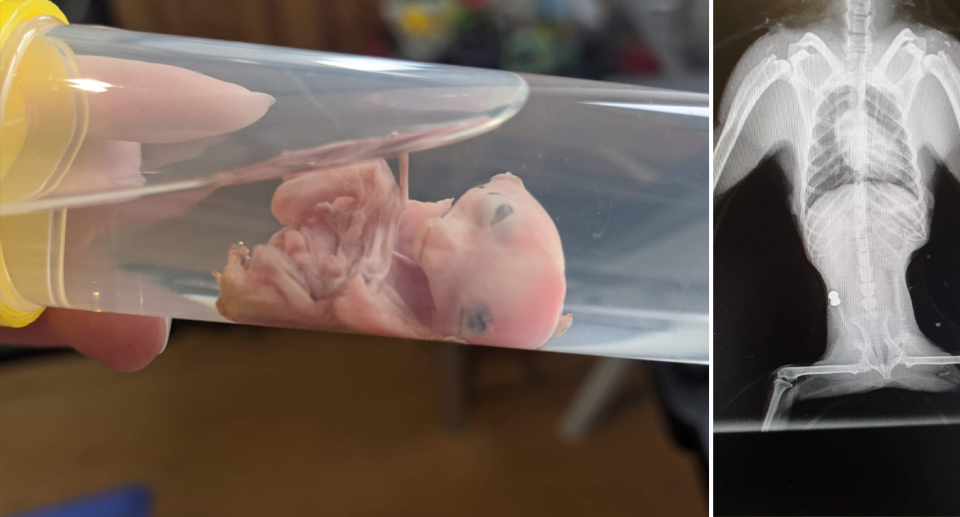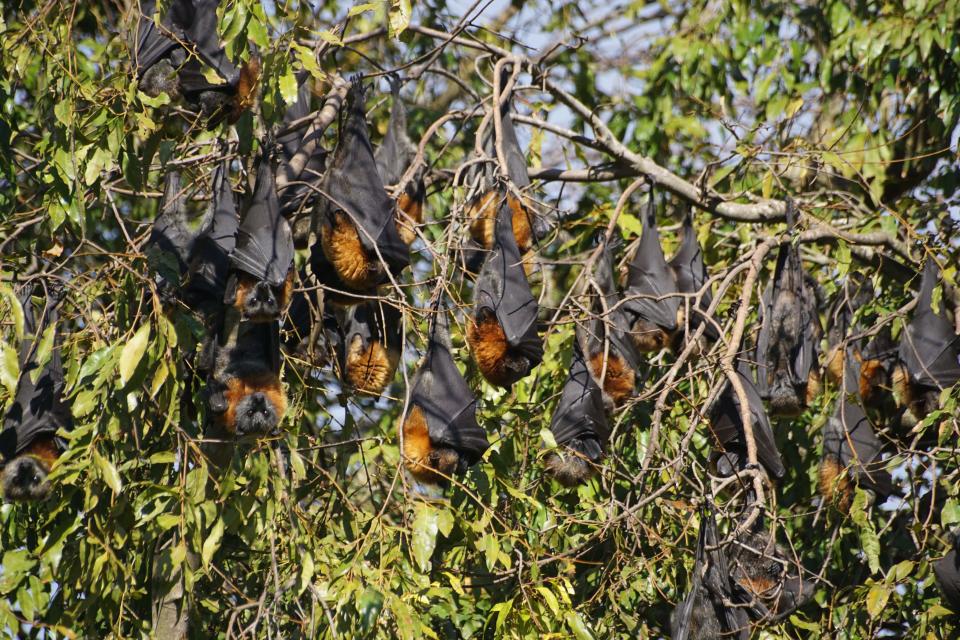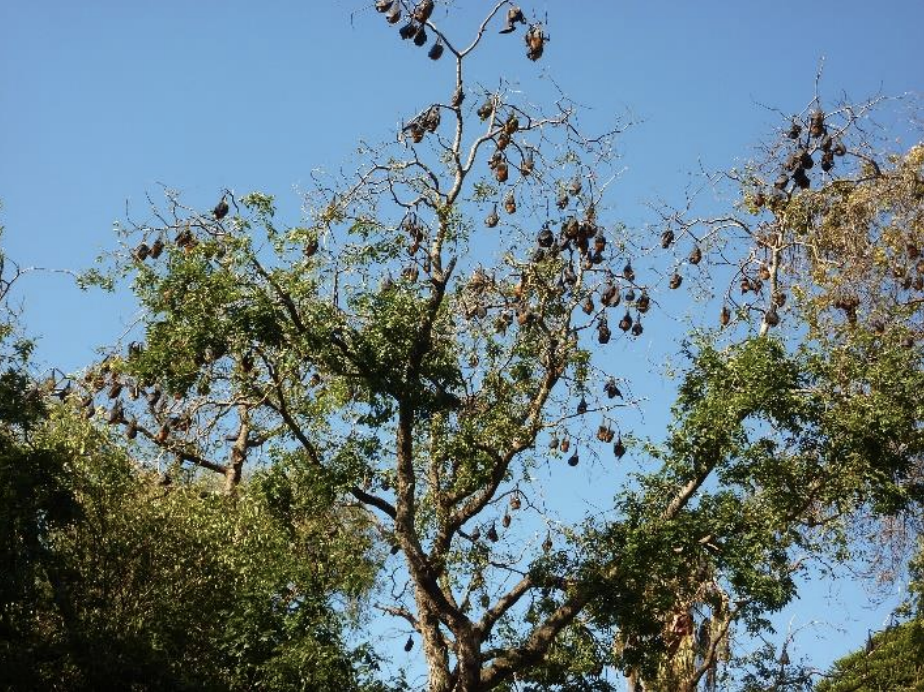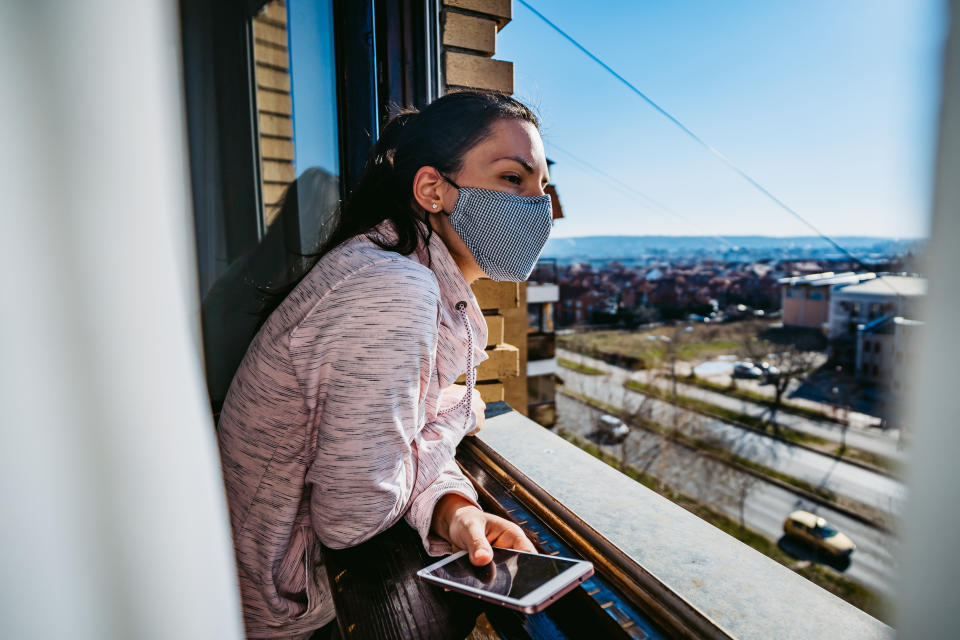'Smoke and loud bangs': Endangered bats at risk as relocations go ahead
Smoke, flashing lights and loud bangs could be putting the future of “heavily pregnant” endangered bats at risk, wildlife rescuers fear.
Grey-headed flying foxes, which are listed as vulnerable to extinction, suffered heavy losses last summer due to heat stress, bushfire and drought.
Despite their conservation status, a Victorian government issued permit is allowing for a group of the bats to be moved from their habitat in Colac, 133km south-west of Melbourne. The bats will be dispersed using sensory devices.

While the department of environment (DELWP) says they take the impact of bushfire into account when issuing permits to control wildlife, the relocation request was approved last year, before the devastating summer, prompting wildlife advocates to call for a reassessment.
Concern dispersal could stress pregnant bats
Wildlife Victoria’s bat coordinator Tamsyn Hogarth said as many as 10,000 juveniles died in Melbourne last season due to heat stress, leading grey-headed flying foxes to change their breeding behaviour this year.
According to Ms Hogarth, safeguards that require the dispersal to stop on August 31 to minimise the impact on birthing animals may not be working as designed this year.

Over the last two weeks, at least three heavily pregnant grey-headed flying foxes have unseasonably come into care around Melbourne.
One animal, which was shot in an unrelated incident, was found to have a baby of significant size on July 2.
A second safeguard written into the permit requires a biologist be be on site to ensure stress is minimised.
Part of his role is believed to be looking for signs of pregnancy in the roosting bats, however Ms Hogarth is concerned that without an X-ray it’s impossible to tell if a bat is carrying a baby until its bones harden.
The stress of relocation has been known to cause heavily pregnant bats to abort their young, and Ms Hogarth fears that the dispersal could be putting added pressure on a species already struggling for survival.

“They’re coming in to sleep after possibly flying 30km that night and being subjected to bright lights and noise and that can cause issues down the line,” she told Yahoo News Australia.
“They can end up having deformed babies, but more often than not, they miscarry.
“If a mother’s flown off, she could have a long labour that’s lasted many hours, so you wouldn’t find any signs of her baby in the park. It would most likely be dropped far away.”
Bats causing a ‘terrible stench’ and ‘health issue’
The onsite ecologist said in a text message that he was unable to comment on the situation, stating all requests for comment must go through council.
Colac Otways Shire did not respond to specific questions from Yahoo News Australia, but advised on Wednesday that the relocation program had been suspended as all animals had now flown away.
The permit was issued for three years and remains active, and council has indicated it will continue to monitor the park in case the bats return.
The council’s Tony McGann said in a press release that in recent years the flying foxes have been impacting “significant trees”, causing a “terrible stench” and their presence is a health issue.
A survey of 115 locals conducted by council found that 66% of respondents thought the bats created a “negative experience” in the gardens.
Dispersal began at a time when there were estimated to be between 150 and 200 bats in the gardens, in an effort to relocate them before summer amid concern numbers could swell to 7000.
Council is believed to be monitoring the areas where the bats have moved and has identified between 20 and 30 individuals roosting around the town.

Call for a ‘fresh approach’ to wildlife management
Professor Clive Phillips from the Centre for Animal Welfare and Ethics at the University of Queensland, believes that it’s time for a “fresh approach” when it comes to wildlife management.
Zoonotic diseases such as lyssavirus and Hendra virus can remain dormant in flying foxes until they are put under significant stress and their immune system is weakened.
“Stress has a really significant effect on an animal's immune system,” Prof Phillips told Yahoo News Australia.
“It acts very quickly, and it reduces the cell based immunity and the general immunity that the animal has in its body.
“This makes the animal very susceptible to disease, because it can't fight those foreign bodies which come into the animal's blood supply.

Prof Phillips said that because of the fear people have of wild animals, everyone wants them to be moved on and that is problematic.
“There isn't inexhaustible supply that habitat for them to live in,” he said.
“What we've been doing is managing the wildlife essentially, to enable them to survive, but they need not only to survive, they need to thrive.”
Life without nature an ‘extinction of experience’
Unlike much of the world, Australians are fortunate to have biodiversity within urban areas, and Mr McCormack believes living in this environment can be beneficial to health.
Chris McCormack is the cofounder of Remember the Wild, a charity working to connect Australians with nature in their cities and towns.
A report released by the organisation on Wednesday found that during the first Stage 3 lockdown in Victoria, 82 per cent of respondents were using nature as a way to “relax and feel good” more than before.
How Chinese farmers could prevent the next pandemic, experts reveal
'Something’s going to give': Platypus staring down the barrel of extinction
The surprising list of animals hiding in our cities which face extinction
Devastated residents dread cull of beloved kangaroos living amongst them
“People were flocking to natural areas around their homes, because they wanted to interact with the natural world,” Mr McCormack said.
“In terms of wildlife, we had all these written responses from people who were all of a sudden noticing things noticing animals that they'd never noticed before.
“They understand the birds in their backyard as individuals and not just sort of inanimate objects.”

Mr McCormack says biodiversity says urbanisation risks people narrowing their experiences into a human centric world.
“It’s the extinction of experience,” he said.
“So, it’s this idea that we're increasingly living lives devoid of contact with nature, with animals with plants, whatever it might be.
“When we push wildlife away from us, we have to think about the experiences that are going extinct, the experiences that our children will never have.”
Do you have a story tip? Email: newsroomau@yahoonews.com.
You can also follow us on Facebook, Instagram and Twitter and download the Yahoo News app from the App Store or Google Play.




